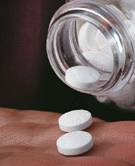Clinical and community-based approaches should be used to increase aspirin use among low-use groups
TUESDAY, July 21, 2015 (HealthDay News) — About seven in 10 Americans with a history of cardiovascular disease (CVD) or stroke regularly take aspirin, according to a report published in the July 17 issue of the U.S. Centers for Disease Control and Prevention’s Morbidity and Mortality Weekly Report.
The study was based on an analysis of data from the 2013 Behavioral Risk Factor Surveillance System. Twenty states and the District of Columbia were included in the annual telephone survey. Of the 175,523 adults who participated in the survey, 12.5 percent reported a history of coronary heart disease, stroke, or both.
The researchers found that of the eligible adult respondents with preexisting CVD (17,984), 70.8 percent reported regular aspirin use, defined as every day or every other day. Nearly 93.6 percent of regular low-dose aspirin users with a history of CVD said they take it for heart attack prevention. Four out of five (79.6 percent) said they take it for stroke prevention, and 76.2 percent for both heart attack and stroke prevention. By state, aspirin use ranged from 71.7 percent of people with a history of CVD in Mississippi to 44.3 percent in Missouri.
Men, people aged 65 and older, whites, and those with at least two cardiovascular risk factors are more likely to use aspirin than other groups. To improve adherence to evidence-based practice guidelines, the researchers said doctors and community health care providers should target groups reporting lower aspirin use. These include Hispanics, blacks, and those without a high school diploma.
Full Text
Copyright © 2015 HealthDay. All rights reserved.








